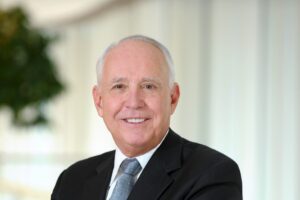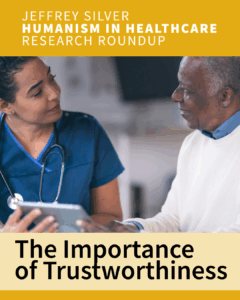Each year, the Gold Foundation and the Accreditation Council for Graduate Medical Education (ACGME) recognize institutions that foster a respectful, humanistic environment for resident physicians by awarding the ACGME and Gold Foundation DeWitt (Bud) C. Baldwin Jr. Award. The recipients of the 2019 DeWitt C. Baldwin Jr. Award are Henry Ford Hospital in Detroit, Michigan; University of Massachusetts Medical School in Worcester, Massachusetts; and Middlesex Health in Middletown, Connecticut. This story is the second in a series examining each winning institution and their best practices, in hopes of spreading these techniques and encouraging other institutions to focus on fostering a humanistic culture. Read our earlier profile of Middlesex Health.
It doesn’t take billions of dollars. Or high-tech innovations.
The creation of a residency education program where humanity, respect, and compassion are central starts with one simple (but often difficult) thing.
Listening.
This is one of the lessons from the University of Massachusetts Medical School in Worcester, MA, winner of the ACGME and Gold Foundation DeWitt (Bud) C. Baldwin Jr. Award. UMass Medical was one of three recipients of the award this year out of a pool of more than 800 ACGME-accredited sponsoring institutions of residency programs.
The graduate medical education program at UMass Medical has about 575 residents and fellows in 53 accredited programs. The school has achieved the highest ACGME (Accreditation Council for Graduate Medical Education) rating for its teaching, showing that a respectful learning environment and great teaching go hand in hand.
Whether it is something small like a free cup of coffee or something big like creating a compassionate institutional leave policy for residents facing emergencies and illness, UMass Medical has learned that if institutions want residents to never lose sight of their patients’ humanity, institutions must also never lose sight of the humanity of the residents they help train.
“It’s a team effort to make our institution a humane place for our residents to work and learn,” said Deborah M. DeMarco, MD in a UMass publication announcing the award. Dr. DeMarco is a Professor of Medicine and Senior Associate Dean for Graduate Medical Education at UMass Medical School.
“We were just thrilled to get this award,” Dr. DeMarco said.
One challenge UMass Medical faced was that residents did not feel valued – a particularly troubling problem, Dr. DeMarco said, because “residents are our eyes and ears on the ground about what we need to do better.”
UMass Medical started holding resident “town halls” to gain a better understanding of the issues that made residents’ day-to-day lives more difficult at work. The initiative started several years ago, in part, to comply with an ACGME requirement that residency programs have a resident forum, and has led to meaningful change.
“Out of that was born our resident appreciation week,” she added, in which residents get extra perks like free coffee and gift cards to local restaurants as well as staff and others taking time to thank them for the hard work they do all year.
“It’s a small thing, but it lets the residents know they’re appreciated,” Dr. DeMarco said.
In 2019, UMass Medical aligned its resident appreciation week with the Gold Foundation’s Thank a Resident Day, which capped off the week.
Since then, the town halls have become integrated into other regular resident meetings – but the emphasis on treating residents with care and respect has been strengthened.
UMass Medical implemented an institutional leave policy that protects residents who are facing illness or other emergencies, but who may not qualify for the federal Family and Medical Leave Act (FMLA).
The school’s chapter of the Gold Humanism Honor Society also inducts a number of qualified residents who model the highest ideals of humanistic care into its ranks each year.
And Patient Experience Panels allow healthcare professionals to hear directly from former patients and their family members.
“People just talk to the residents about their experiences, whether it’s good or bad,” Dr. DeMarco said. “I attended two of them, and they were just fabulous. The residents got so much out of them.”
Schwartz Rounds are another great way for residents and medical students to come together, inter-professionally with nurses, to debrief and openly discuss patient care issues
In addition, UMass Memorial Health Care and UMass Medical School share a Standards of Respect initiative, along with various diversity initiatives – designed to provide training to all faculty, residents, medical students and staff on concepts including unconscious bias and the imperative to treat everyone with care and respect.
More complex diversity trainings include the development of templates to help healthcare personnel be more inclusive when presenting their work. DeMarco said even small gestures, such as adding a rainbow sticker to staff ID cards has been shown help LGBTQ patients feel more welcome and, thus, be more likely to be engaged in their own care.
At UMass Medical, residents are also taking the lead in establishing initiatives to promote humanism in medicine. One of which UMass is particularly proud is the “Mindful Rounding Initiative” on inpatient pediatrics, started by residents including Emily Levoy, who earned a “Back to Bedside” grant from the ACGME.
“Dr. DeMarco and GME at UMass have been extremely supportive of this project and have also served as tireless advocates for residents’ concerns. Even when problems don’t have a simple fix, we have been able to have open discussions and work toward solutions. Just having that open-door policy and an open line of communication with GME makes me feel heard, valued, and supported,” Levoy said.
When asked what top three initiatives she would recommend to other GME programs interested in infusing their culture with more humanism and respect, Dr. DeMarco quickly mentioned the resident appreciation week.
“The resident appreciation week is easy,” she said.
But, as for choosing the other two initiatives she would recommend first to other institutions, DeMarco hesitated – not because there were so few to choose from but because there were so many.
In the end, Dr. DeMarco recommended expanding in-house counseling services and adding 24-7 access for residents to a fitness center on campus.
“None of the initiatives cost billions of dollars but they go a long way to letting residents know we appreciate them,” she said.
And neither is the secret of UMass Medical’s success with residents that led to the Baldwin award recognition in the first place
“I think it is just being open with the residents,” Dr. DeMarco said. “We will always try to help them solve challenges and encourage them to bring their concerns to the GME office so we can help.”



